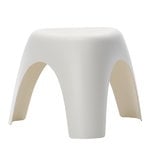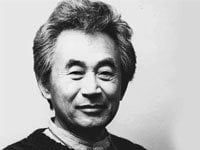Sori Yanagi’s Elephant Stool from 1954 is one of the most famous objects of modern Japanese design. Produced by Vitra, the smoothly shaped stool stands stable as an elephant with its wide legs. The Elephant Stool can be used both inside and outdoors – place it in the children’s room, kitchen or hall, or take a pile of stackable, lightweight stools with you to the garden or picnic.


Elephant Stool, white
Vitra
Description
Sori Yanagi’s Elephant Stool from 1954 is one of the most famous objects of modern Japanese design. Produced by Vitra, the smoothly shaped stool stands stable as an elephant with its wide legs. The Elephant Stool can be used both inside and outdoors – place it in the children’s room, kitchen or hall, or take a pile of stackable, lightweight stools with you to the garden or picnic.
Product details (5)
- Colour
- White
- Width
- 51.5 cm
- Depth
- 46.5 cm
- Height
- 37 cm
- Material
- Polypropylene
- Product ID
Designer
Sori Yanagi (1915–2011) was a Japanese designer who had a great influence on both, the post-war Japanese design as well as international modern design. Besides furniture and lighting, the productive designer designed also toys, motorcycles and even metro stations. Yanagi’s designs often merge simple practicality and opportunities of western industrial design with elements and techniques from Japanese artisan traditions – a great example is the plywood Butterfly stool, nowadays produced by Vitra.
View all productsReviews (0)
Sustainability
The Product Sustainability Framework, our criteria of sustainable design, helps you find the most sustainable products in our selection. Read below which sustainability criteria this product has met.
Working conditions & labour 7/9
-
Equal opportunities for all employees
-
Commitment to UN Global Compact, fair compensation for all employees
-
Corporate responsibility requirements defined and communicated for suppliers
-
Systematic work for improved inclusion and well-being in the workplace
-
Transparent supply chain
-
Suppliers' compliance to a code of conduct ensured
-
Compliance to the UN Guiding Principles on Business and Human Rights ensured in the supply chain
-
Direct suppliers audited and certified
-
Support for community involvement in the supply chain
Eco-friendly production 7/9
-
Fair and resource-wise water-use in production
-
No incineration or landfilling of returned items
-
No use of endangered species as materials
-
No direct environmental emissions or waste (excl. GHGs) from production
-
Production and material sourcing that respect biodiversity, animal rights, and natural ecosystems
-
Material-efficient and ecological packaging
-
No potentially harmful chemicals used in own production
-
The sustainability of direct suppliers' production is addressed and monitored
-
Positive impact on nature’s well-being through operations that regenerate natural ecosystems
Climate impact 5/8
-
Company's direct greenhouse gas emissions identified and commitment to reduction
-
Product's carbon impact identified and commitment to reduction
-
Guidance on energy- and eco-efficient use of the product
-
Contribution to climate initiatives beyond the brand’s direct operations
-
100 % renewable energy in own production and operations
-
Low-carbon or compensated transportation
-
Carbon footprint of the product calculated and goals set to reduce it
-
Carbon neutral or carbon negative product
Sustainable materials 6/6
-
Sustainable and long-lasting material choices
-
No harmful or hazardous substances
-
Responsible raw material sourcing and production
-
Materials suited for circularity: monomaterials, recyclable finishings, renewable or recycled contents etc.
-
Ecological materials: natural, biodegradable, recyclable or recycled contents
-
Outstanding materials in terms of innovativeness, responsibility, sustainability and circularity: local production or sourcing, 100 % recycled content, C2C-certification etc.
Circular design 5/5
-
High aesthetic quality promoting long-term use of the product
-
Technically durable product design and material choices
-
Design for enduring life-long quality
-
Design and support for product maintenance, repair and upgradability
-
Innovative circular design solutions: circular service system, resale platform, remanufacturing, collection of used products, etc.




